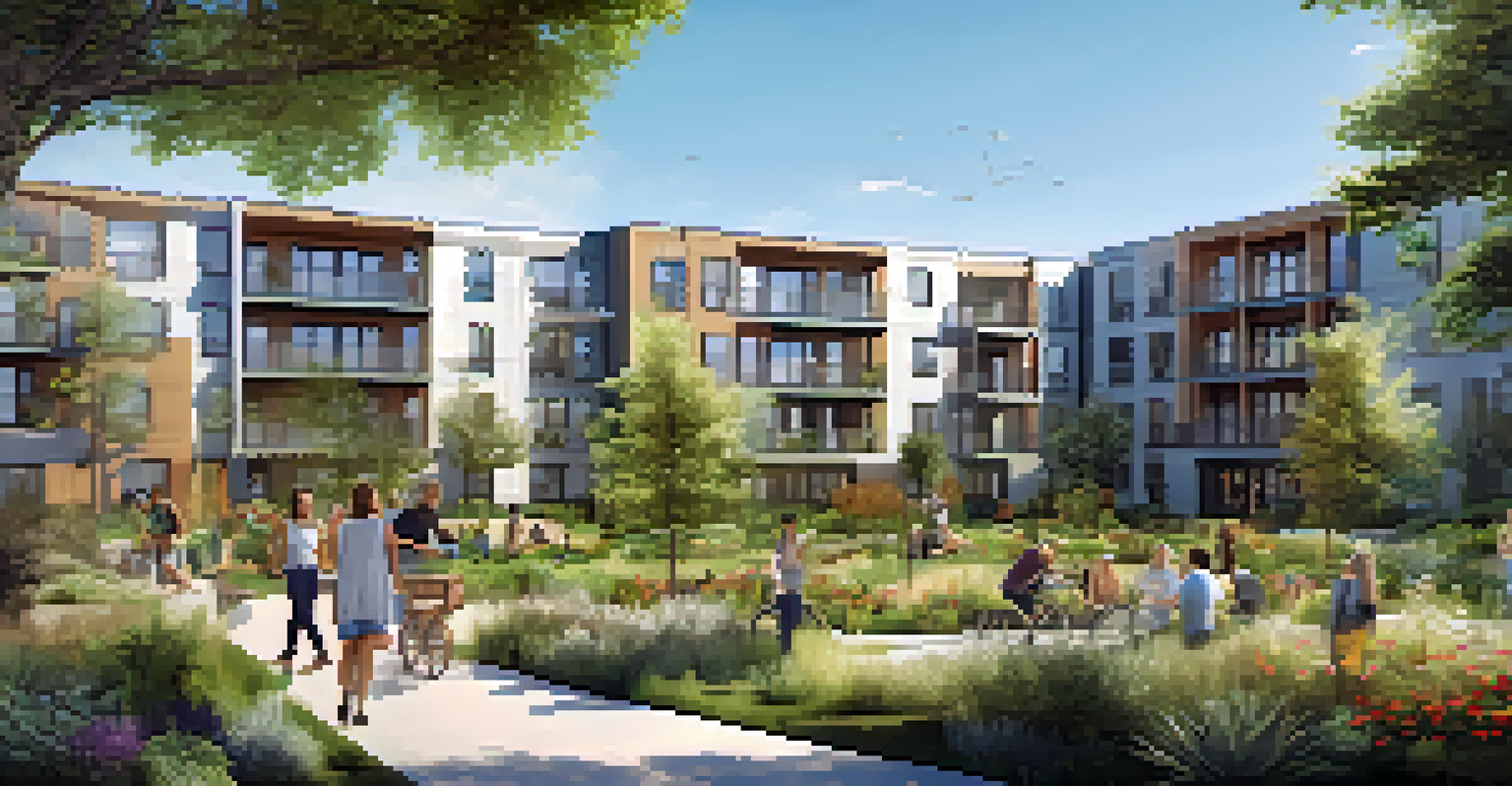Community Engagement: A Factor in Property Investment

Understanding Community Engagement in Real Estate
Community engagement refers to the process of involving local residents and stakeholders in decision-making about their neighborhoods. In real estate, this means understanding the needs and desires of the community when planning developments. When property investors actively engage with the community, they can tailor projects to better fit the local context, enhancing both the project's appeal and viability.
The best way to predict the future is to create it.
For example, a developer looking to build a new apartment complex can hold community meetings to gather feedback on design and amenities. This not only builds trust but also helps investors avoid costly missteps. When residents feel heard, they are more likely to support the project, creating a win-win situation for both parties.
Ultimately, community engagement is about creating spaces that reflect the identity of the neighborhood. It fosters a sense of belonging and ownership among residents, which can lead to increased property values and a more vibrant community.
Why Community Matters in Property Investment Decisions
Communities play a critical role in shaping the desirability of property investments. When potential buyers or renters evaluate a location, they consider factors such as safety, amenities, and overall livability. Thus, an engaged community can significantly enhance the attractiveness of a property, impacting its market value and rental rates.

For instance, neighborhoods with active community organizations often see better-maintained public spaces, which can directly affect property appreciation. An area with regular community events, like farmers' markets or festivals, can create a buzz that draws in not just residents but also investors looking for promising opportunities.
Community Engagement Boosts Value
Involving local residents in planning enhances property appeal and can lead to increased market value.
Therefore, property investors should not overlook the social fabric of a community. Engaging with residents and local leaders can provide invaluable insights that lead to informed investment decisions, ultimately resulting in a more profitable venture.
Building Trust Through Community Collaboration
Trust is a fundamental component of successful property investment, and community collaboration fosters this trust. When investors work alongside community members, they demonstrate a commitment to improving the area, which can lead to stronger relationships. This collaboration can take many forms, from joint planning sessions to partnerships with local businesses.
Community is much more than belonging to something; it's about doing something together that makes belonging matter.
Consider a scenario where a developer wants to revitalize an underdeveloped area. By involving local residents in the planning process, they can gain insights on what the community truly values, such as parks, retail spaces, or affordable housing. This approach not only garners support but can also prevent potential pushback from residents who might feel excluded from the process.
In essence, community collaboration transforms the investor-resident dynamic into a partnership. This not only enhances project outcomes but also creates a legacy of goodwill that can benefit future developments.
The Economic Benefits of Community Engagement
Engaging with the community can lead to tangible economic benefits for property investors. When developers listen to residents and integrate their feedback, they often create projects that are more in line with market demands. This alignment can result in quicker sales or rentals, reducing vacancy rates and increasing profitability.
Moreover, properties that are developed with community input often see lower resistance and fewer legal challenges. When a project has community backing, it is less likely to face opposition from residents or local governments, which can save investors time and money in the long run.
Collaboration Builds Trust and Success
Working alongside community members fosters trust and can result in smoother project development.
Ultimately, the economic benefits of community engagement extend beyond immediate financial gains. A well-integrated property can boost the local economy, creating jobs and attracting new businesses, which in turn enhances the investment's value.
Enhancing Property Value Through Local Involvement
Investing in a community means investing in its future, and local involvement can significantly enhance property value. Properties that are seen as community-oriented often attract higher bids due to their perceived stability and desirability. This is particularly true in areas where residents take pride in their neighborhood and actively participate in its improvement.
For example, a property developer who collaborates with local artists for public art installations can create a unique identity for the area. This not only beautifies the neighborhood but also attracts visitors and potential buyers, increasing demand for nearby properties.
In this way, local involvement serves as a catalyst for property value appreciation. Investors who recognize the importance of community dynamics can leverage these relationships to create more valuable and sustainable investments.
Sustainable Development Through Community Feedback
Sustainability is increasingly becoming a priority in property investment, and community feedback is crucial in achieving this goal. By engaging with residents, developers can gather insights on environmental concerns and preferences, leading to more sustainable practices. This could include everything from integrating green spaces to utilizing eco-friendly materials in construction.
Imagine a property investor who consults with the community about a new development. Residents might express a desire for energy-efficient buildings or accessible public transit options. By addressing these needs, the developer can create a project that not only meets market demands but also contributes positively to the environment.
Sustainability Through Local Insights
Gathering community feedback helps create sustainable developments that align with residents' environmental priorities.
Incorporating community feedback into sustainable development strategies not only benefits the planet but can also enhance the investor's reputation. As sustainability becomes a key factor for many buyers, being known for environmentally conscious developments can set an investor apart in a competitive market.
The Future of Property Investment and Community Engagement
As the landscape of property investment continues to evolve, the importance of community engagement will only grow. Investors who prioritize collaboration with residents will likely find themselves ahead of the curve. In a world that increasingly values transparency and inclusivity, being attuned to community needs can foster loyalty and long-term success.
Looking ahead, technology will play a significant role in facilitating community engagement. Online platforms can provide residents with a voice in the planning process, allowing for broader participation and quicker feedback. This technological shift can help bridge gaps between investors and communities, offering new opportunities for meaningful collaboration.

In conclusion, the future of property investment lies in the hands of those who recognize the value of community. By actively engaging with residents, investors can create projects that not only meet financial goals but also enrich the neighborhoods they touch.